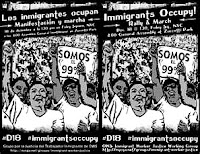If you look at the latest stamina of President Obama’s rhetoric on issues you would have to agree that it is far more forceful than a year ago. And it was just a little more than a year ago that the Occupy Movement started; Occupy Wall Street held its first demonstration on September 17, 2011. At that time the Tea Party was going full blast and deciding much of what was going on in Congress.
TPers still have their influence but it is waning, evidenced by recent GOP conciliations on the payroll tax cut.
Arlen Grossman, writing in OpEdNews, talks of how the President was willing to make all kinds of deals with the GOP on Social Security, Medicare, Medicaid, and the taxing of the rich back in early to mid-2011. And then the Occupy Movement began to do their number in September and the American public suddenly realized there were several inequities in the system that needed to be fixed.
It all centered around the 1% that controlled all the wealth, leaving the other 99% to fend for itself in an arena that was clearly weighted toward the 1%.
“Issues of class and economic fairness that had been swept under the rug for years suddenly became issues for discussion. Middle class Americans began to understand that corporations and the wealthy were paying a lower tax rate than they were,” says Grossman. And Barack Obama became “bolder,” more resolute in where he stood on the issues he had had to appease Republicans on just a year ago.
Grossman adds: “I can't help but think that the Occupy movement has played a major role in reversing the focus of politics from last fall until now. If Occupy disappeared right now, they could get credit for accomplishing quite a bit in a short time.”
The New York Times says that although the Occupy camps are dismantling, it is “far from dissipating.” They are only regrouping for the next thrust which will include larger marches and strikes coming up in the spring, designed to rebuild momentum, returning to the issues of inequality and corporate greed. New York City
William A. Galston, a senior fellow and an expert on political strategy at the Brookings Institution in Washington
An editorial from USA Today says the Occupy Movement is “…fading out in a whimper.” The paper also says the movement hit a rich vein of dissent with Wall Street, “But after successfully tapping into this vein, the Occupiers chose a course best described as doing nothing.” They may have a point that the demonstrators put too much stock in their physical presence in an encampment, but others might counter that they were simply taking time to reorganize.
 |
| Pew Research Report |
One thing is very clear. “Occupy must include minorities.” is an article from the Pasadena Sun that comments on the economic regression of the middle-class in America Pew Center
In other words, who is more likely to be affected by the Occupy Movement that blacks and Hispanics?
The piece made another excellent point that in good times the U.S. Arizona
The unemployment rate for black Americans is at 15 percent, compared to around 8 percent for whites. But the majority of the movement is white as reported by A Fast Company survey recently that found that African Americans, who are 12.6 percent of the U.S. Occupy Wall Street . The Washington Post also said, “We can’t expect our civil rights organizations and political leaders to help blacks rage against the corporate machine when they are part of it.”






















